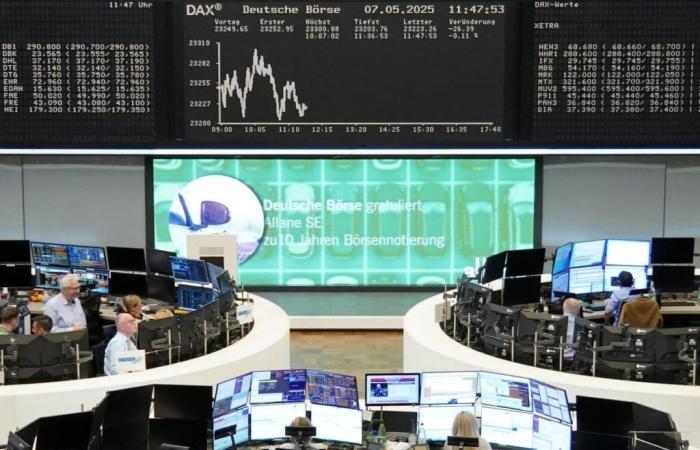The Dax Index, reference of the German stock market, goes up this Friday to its historical intra -state maximum, promoted by the expectations of uncalled commercial warfare before the commercial negotiations between the US and China this weekend. The indicator advances 0.8% to 23,528.88 points, while the European Euro Stoxx 50 index wins 0.5%. The Dax has quoted this year based on the commercial war, with an accumulated fall of up to 16% after the tariffs announced on April 2 by Donald Trump. The 90 -day truce revived the markets and, in the week in which Germany premieres chancellor, the German selective marks record.
But not everything is tariffs. The optimism about the German economy has also promoted the purchase of German values. “The latest economic data, especially in Germany, have been very favorable,” Claudia Panseri, Investment Director for France from Ubs Wealth Management told Bloomberg. “These good news arrive while the European Central Bank is giving signs that the guys could lower a little more than investors expected,” he adds.
The German index is quoted with the highest premium compared to other European indices since 2009. European actions in general have been favored in 2025 as an alternative to the turbulence of the United States.
Around 4.2 billion dollars entered European shares in the week until May 7, according to a note from Bank of America. The strategist of the entity Michael Hartnett prefers the international variable to the American. “European corporations seem more agile and less exposed to the commercial war,” says Thomas Brenier, chief of Variable Rent of Lazard Fréres.
Friedrich Merz and Trump agreed that commercial disputes must be resolved rapidly and discussed the need for close cooperation between the two nations.
-After the rugged election of Merz as German Chancellor this week, in the second round, Louise Dudley, Global Variable Income Manager of Federated Hermes Limited, considers that the initial vote not favorable to Friedrich Merz, “shows the fragility of the coalition that has been formed.” The expert adds that “despite this uncertainty, the figures of German industrial production have shown a positive trend, increasing 2.7% in March 2025 after a period of prolonged weakness.”
In a report, the Federated Hermes manager adds that “what remains questionable is the longevity of this resurgence due to the impact of tariffs. The uncertainty about the capacity of the German coalition also persists to approve additional cost measures that would continue to prolong the relative positive feeling of the market that Europe has enjoyed so far this year”.
From Scope Ratings they add that the great evidence for the new German coalition government will arrive with the negotiations of federal budgets by 2025 and 2026. “However, these should be provided by the fiscal margin created after the reform of the debt to the debt in March 2025 ″.
In addition, “Germany’s fiscal trajectory will also be evaluated in relation to compliance with European fiscal norms, including a medium-term fiscal-structural plan that will be sent to the European Commission in the coming months,” add the analysts of Scope Ratings in a report.
The firm have updated growth forecasts for Germany that reflect the difficult economic environment in which the country is. “Assuming that a large -scale commercial war between the United States and the European Union is avoided, we expect a 0% growth in 2025 and 1.2% in 2026, driven by fiscal stimuli,” they add.






